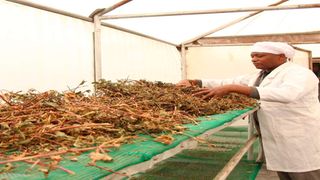
Samwel Kahura with dried African night shade (managu) and red amaranth (terere) on his farm in Kiambu.
Seeds of Gold
Premium
Samwel Kahura finds secret to making money from vegetables
Kimende trading centre, along the Nairobi-Nakuru highway, in Kijabe, Kiambu County, is a busy place.
Farmers in the area mainly grow potatoes, maize and cabbages, a majority that end up in the populous Nairobi.
Seeds of Gold team was in the area to meet Samwel Kahura, the director of Cheer Up Programme, an organisation that helps needy children. We find him slicing collard greens (sukuma wiki) in a chopper machine.
Kahura is in the process of adding value to the vegetables. "Growing up in Burnt Forest, I saw my father cut and dry vegetables and then exchange them with milk or money," he recalls.
He decided to turn this into an income-generating venture for the organisation that he started in 2008.
“I realised that between September and December, vegetables are in short supply yet in the other months, there is usually glut. A bucket of carrots that goes for as low as Sh50 when there is glut hits Sh900 during the dry season.”
He started slicing and drying carrots, pumpkin, bananas, sweet potatoes, African night shade (managu), red amaranth (terere), stinging nettle, rosemary and mint.
“I had invested Sh80,000 in a solar dryer with the money going on purchase of timber and polythene sheet to erect the 4 by 3 metres equipment.”
Using the structure, he dried and sold the produce and as the business grew, Kahura invested Sh150,000 to improve the model of his dryer, turning it into a modern metallic structure measuring 9 by 6 metres with two storeys and can dry over a tonne of food.

Samwel Kahura slices vegetables.
"Initially, we used knives to chop vegetables and fruits, but for efficiency we purchased machines for slicing, a sledge, a small posho mill and stainless steel tables for washing vegetables and drew contracts with farmers to supply vegetables," he says of the venture that employs nine youths.
After slicing, drying and milling the products, he packs them in Cheer Up branded packs, with the products having been certified by the Kenya Bureau of Standards. Every July, he processes and supplies fortified flour in tonnes to a refugee camp in Turkana, which gives his business a major boost.
The flour is for people with special needs such as the elderly and children and it is made up of banana, amaranth and stinging nettle.
“Some 110 kilos of raw carrots when dried give about 10 kilos of dried matter because of its high water content, whereas 70 kilos of raw kales give seven kilos of dried matter,” says Kahura, who has trained in value addition at the Jomo Kenyatta University of Agricultural and Technology (JKUAT) and his products are certified.
Dried collard greens
He sells a kilo of dried collard greens (sukuma wiki) at Sh700, spinach Sh800, a pack of 200 grams of pumpkin flour at Sh200, pumpkin seed flour Sh350, a sachet of 200 grams of carrot flour Sh150 and fortified banana flour Sh150 a kilogram.
According to Kahura, there is a big opportunity in the venture as the market is not yet well-exploited.
“Value addition is well-paying, the business boomed when Covid-19 broke out and most people bought bulk food,” says Mr Kahura, who sells his products in Malindi, Kiambu, Nairobi and Turkana.
Dried vegetables and fruits can last up to one-and-half years, depending on the way they are handled and sealed, he says, adding he sells at least 200 kilos of dried vegetables and 1010 kilos of stinging nettle locally every week. Dominic Kimani, an agribusiness mentor with Seed Savers Network Kenya, says value addition of fresh produce requires one to understand the market and preferences of consumers.
"Before making real investment in terms of infrastructure, ensure that you receive an adequate quantity of fresh produce, by either contracting farmers or having enough space to grow your own."
Kimani notes that in Kenya, there is basically no broader market for dried vegetables, thus this requires value addition to conform to the market needs.
"Such a business requires proper handling and inspection of farm produce from the time of planting to harvesting and processing."





